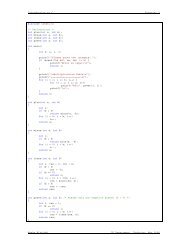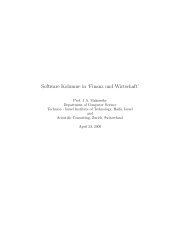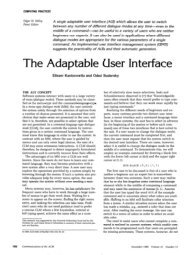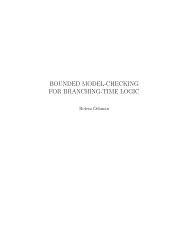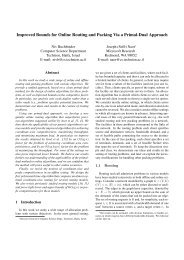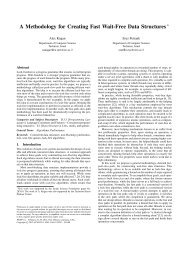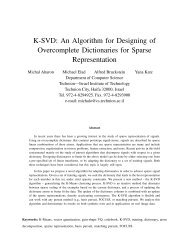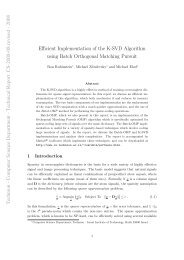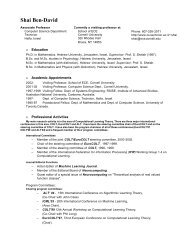anytime algorithms for learning anytime classifiers saher ... - Technion
anytime algorithms for learning anytime classifiers saher ... - Technion
anytime algorithms for learning anytime classifiers saher ... - Technion
Create successful ePaper yourself
Turn your PDF publications into a flip-book with our unique Google optimized e-Paper software.
<strong>Technion</strong> - Computer Science Department - Ph.D. Thesis PHD-2008-12 - 2008<br />
Chapter 2<br />
Resource-bounded Learning and<br />
Classification<br />
In real-life applications, inductive concept <strong>learning</strong> involves several types of cost<br />
(Turney, 2000). In the <strong>learning</strong> phase costs are associated with the acquisition<br />
of feature-values (Melville, Saar-Tsechansky, Provost, & Mooney, 2004; Lizotte<br />
et al., 2003; Sheng & Ling, 2007a) and with tagging examples (Lindenbaum<br />
et al., 2004).<br />
Once the data has been collected, the next stage is model <strong>learning</strong>. This<br />
stage usually requires resources such as memory and computation time. Algorithms<br />
whose results improve with the increase in the allocated resources are<br />
called <strong>anytime</strong> <strong>algorithms</strong>. Anytime <strong>algorithms</strong> are attractive when optimal solutions<br />
require unaf<strong>for</strong>dable resources and quick greedy solutions do not suffice.<br />
Similar situations, where the solution can be either of exponential complexity<br />
and there<strong>for</strong>e prohibitively expensive or non-optimal and fast, are common in AI:<br />
<strong>anytime</strong> techniques have been applied to several AI domains, such as heuristic<br />
search (Hansen, Zilberstein, & Danilchenko, 1997), constraint satisfaction problems<br />
(Fargier, Lang, & Schiex, 1996), and SAT solvers (Wallace & Freuder, 1995).<br />
There are two main classes of <strong>anytime</strong> <strong>algorithms</strong>, namely contract and interruptible<br />
(Russell & Zilberstein, 1996). A contract algorithm is one that gets<br />
its resource allocation as a parameter. If interrupted at any point be<strong>for</strong>e the<br />
allocation is completed, it might not yield any useful results. An interruptible algorithm<br />
is one whose resource allocation is not given in advance and thus must be<br />
prepared to be interrupted at any moment. While the assumption of preallocated<br />
resources holds <strong>for</strong> many induction tasks, in many other real-life applications it<br />
is not possible to allocate the resources in advance. There<strong>for</strong>e, in this work we<br />
are interested in both types of <strong>anytime</strong> <strong>algorithms</strong>.<br />
During the classification phase, costs are associated with the measurements<br />
required by the model and with the prediction errors. Following previous works<br />
13



